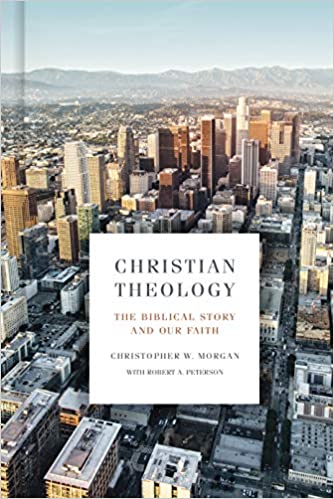A Book Review from Books At a Glance
By Andrew J. Spencer
This is a golden age of theological publishing for orthodox, English-speaking Christians. Each year hundreds of new volumes on various aspects of the Christian life roll off the presses of a number of publishers with books that can benefit readers through careful handling of doctrines, gracious argumentation, and reliance on Scripture and the Great Tradition of Christianity. Amid those many volumes in recent years there have also been a number of systematic theologies published. Most of them are good. Many of them are lengthy volumes that seek to handle Scripture and tradition comprehensively all in one fell swoop. A good number of recent systematic theologies are concise, single-volume works that try to summarize the field into a digestible package, but have too little space to do more than offer an overview of any doctrine. There has been room in the market for the goldilocks volume that hits somewhere between the two extremes.
In Christian Theology: The Biblical Story and Our Faith, Christopher Morgan, along with contributor Robert Peterson, has split the difference between a massive tome and slender summary. This new volume offers some of the best features of both approaches. Combined with an even-handed approach to essential doctrines of the faith and clear, careful writing, Christian Theology fills a niche in an otherwise crowded field.
The book is largely unremarkable in its coverage of doctrines, which is a positive attribute for a volume of this sort. After a very brief introduction, there are twelve content chapters dealing with common doctrinal headings: Knowing God, God’s Revelation, God the Trinity, God’s Attributes and Works, Humanity and Sin, Jesus, Jesus’s Saving Work, Salvation, the Holy Spirit, the Church, the Future, and the Christian Life. The arc from prolegomena to application is well-considered and helpful. Though largely consistent with existing works in the field, Christian Theology is different than many systematics in that it ends with a chapter on discipleship. Morgan brings some of the doctrinal threads together to help readers bring the concepts down to lived experience.
Each chapter follows a similar pattern, which supports the overarching purpose. The chapters begin with a short overview, objectives, and a detailed outline. Then they shift to the big picture biblical perspective on the particular doctrine, followed by a more detailed treatment of several key passages. The outline then moves to discussions with broader headings that explore the doctrine theologically with detailed subheadings supporting various aspects of those larger doctrinal questions. The chapter concludes with a list of key terms and a targeted list of resources that support further research. The companion volume, A Concise Dictionary of Theological Terms offers ample definitions for each of the highlighted terms and pairs well with the main volume.
This volume stands out among evangelical systematic theologies because it is built on a theological method that recognizes the primacy of the biblical witness but also explicitly treats the generations of theological reason on which our contemporary understanding of theology is built. In addition to the main content from Morgan and Peterson, there are also excerpted passages for many major doctrines from significant historical figures. The authors also recognize the significance of the global church, including interstitial passages from majority world theologians that illustrate the given doctrine and highlight the multicultural value of orthodox theology.
Given that Christian Theology comes through the Southern Baptist Convention’s academic publishing house, it should come as little surprise that the volume leans toward believer’s baptism by immersion as the best application of biblical teaching on the subject. The authors present differing views on the topic charitably, including extensive quotes from several confessions and catechisms endorsed by denominational entities. Their conclusion promotes a traditional baptistic view, but does so generously. The authors’ handling of this most contended doctrine illustrates the general approach of the volume and makes this a text that is appropriate for settings outside of explicitly Baptist classrooms.
No systematic theology can do everything. There are always opportunities to wish for more majority world voices, greater coverage of historical theology, or more detailed discussions of the nuances of doctrinal debates. However, as an introductory volume this mid-sized book balances the competing demands admirably. Christian Theology weighs in at just under 600 pages of text, which is about half the length of popular volumes like those authored by John Frame, Milliard Erickson, Michael Horton, or Wayne Grudem. This makes Morgan’s volume much less imposing for readers looking for a good introduction that can provide a solid place to step off into future study.
This volume is written clearly without excessive jargon. It intentionally brings theology into daily life, using headings like “Our God is Holy” rather than “The Holiness of God” while discussing God’s attributes. Such an approach reminds readers that theology is more than an academic discipline with information to be memorized and tests to be passed.
The approach of Christian Theology makes it suitable for use in the local church, as a high school text for homeschoolers or for a private school, or as the primary text for an undergraduate course at an evangelical institution. Most seminaries courses will likely prefer a more expansive volume, especially for a two or three semester systematic theology sequence, but the volume could be made to work with additional reading assignments. This is a book that deserves a wide readership and adoption among orthodox, evangelicals seeking to understand systematic theology better.
Andrew J. Spencer (PhD, Southeastern Baptist Theological Seminary) lives in Monroe, MI. He is the editor The Christian Mind of C.S. Lewis (Wipf & Stock, 2019), and frequently writes at www.EthicsAndCulture.com.
